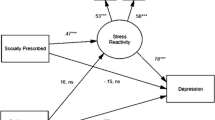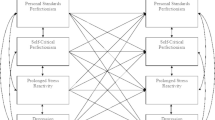Abstract
The relation between stressful life events, perfectionism, and relative depression in a university sample was studied. Results indicated that the relationship between stressful events and depression was significant only for participants who scored above the median on a scale of perfectionistic attitudes. Additional regression analyses indicated that later depression was significantly predicted by prior depression and current perfectionistic attitudes. On the other hand, stressful life events and prior perfectionistic attitudes did not significantly predict later depression. Taken together these findings suggest that perfectionistic attitudes are a concomitant of depression and that they may mediate the relationship between stress and depression. Although strong evidence of cognitive vulnerability was not obtained, the need for controlled experimentation with clinical samples was discussed.
Similar content being viewed by others
References
Beck, A. T., Rush, A. J., Shaw, B. F., & Emery, G. (1979).Cognitive therapy of depression. New York: Guilford Press.
Beck, A. T., Ward, C. H., Mendelson, M., Mock, J., & Erbaugh, J. (1961). An inventory for measuring depression.Archives of General Psychiatry, 104 268–294.
Bumberry, W., Oliver, J., & McClure, J. (1978). Validation of the Beck Depression Inventory in a university population using psychiatric estimate as the criterion.Journal of Consulting and Clinical Psychology, 46 150–155.
Burns, D. D. (1980, November). The perfectionist's script for self-defeat.Psychology Today, pp. 34–44.
Dyck, D. G., Erdile, L., Herbert, P., & Hewitt, P. (1983, August).Severity of depression, mood activation and schematic processing. Paper presented at the meeting of the American Psychological Association, Anaheim.
Hammen, C. L. (1980). Depression in college students: Beyond the Beck Depression Inventory.Journal of Consulting and Clinical Psychology, 48 126–128.
Hammen, C. L., Dyck, D. G., & Miklowitz, D. (in press). Stability and severity parameters of depressive self-schema responding.Journal of Social and Clinical Psychology.
Hollender, M. H. (1978). Perfectionism: A neglected personality trait.Journal of Clinical Psychiatry, 29 210.
Holmes, R. A., & Rahe, P. L. (1967). The social readjustment rating scale.Journal of Psychosomatic Disorders, 11 213–218.
Kuiper, N. A., Olinger, L. J., & MacDonald, M. R. (in press). Depressive schemata and the processing of personal and social information. In L. B. Alloy (Ed.),Cognitive processes in depression. New York: Guilford Press.
LaPointe, K. A., & Crandell, C. J. (1980). Relationship of irrational beliefs to self-reported depression.Cognitive Therapy and Research, 4 247–250.
Leon, G. R., Kendall, P. C., & Garber, J. (1980). Depression in children: Parent, teacher and child perspectives.Journal of Abnormal Child Psychology, 8 221–235.
Meyersburg, H. A., Ablon, S. L., & Kotin, J. (1974). A reverberating psychic mechanism in the depressive processes.Psychiatry, 37 372–386.
Paykel, E. S. (1979). Recent life events in the development of the depressive disorders. In R. A. Depue (Ed.),The psychobiology of the depressive disorders: Implications for the effects of stress. New York: Academic Press.
Rahe, R. H., & Arthur, R. J. (1968). Life-change patterns surrounding illness experience.Journal of Psychosomatic Research, 11 341–345.
Smith, T. W., Boaz, T. L., & Denney, D. R. (1984). Endorsement of irrational beliefs as a moderator of the effects of stressful life events.Cognitive Therapy and Research, 8 363–370.
Weissman, A., & Beck, A. T. (1978).Development and validation of the Dysfunctional Attitude Scale. Paper presented at the annual meeting of the Association for the Advancement of Behavior Therapy, Chicago.
Author information
Authors and Affiliations
Additional information
This article is based on part of an honour's thesis by the first author under the direction of the second author. The study was supported by the Natural Sciences and Engineering Research Council of Canada, Grant #A9941. The authors thank Linda Wilson, Myles Genest, and David Burns for assistance in completion of the research.
Rights and permissions
About this article
Cite this article
Hewitt, P.L., Dyck, D.G. Perfectionism, stress, and vulnerability to depression. Cogn Ther Res 10, 137–142 (1986). https://doi.org/10.1007/BF01173389
Issue Date:
DOI: https://doi.org/10.1007/BF01173389




